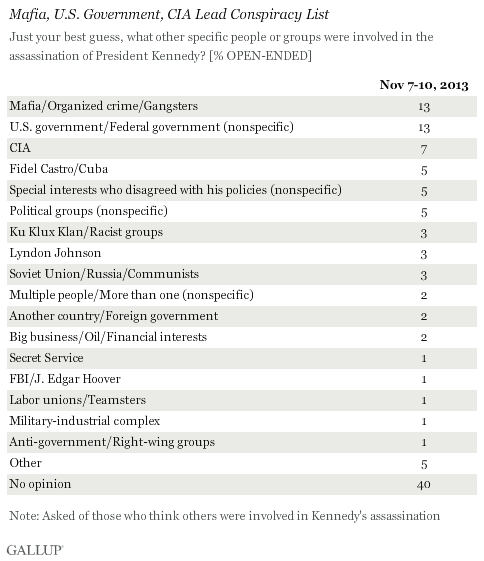Article Source: http://news.gallup.com/poll/165893/majority-believe-jfk-killed-conspiracy.aspx

Majority in U.S. Still Believe JFK Killed in a Conspiracy
Mafia, federal government top list of potential conspirators
WASHINGTON, D.C. -- As the 50th anniversary of President John F. Kennedy's assassination approaches, a clear majority of Americans (61%) still believe others besides Lee Harvey Oswald were involved. But this percentage is the lowest found in nearly 50 years.
Thirty percent of Americans believe that Oswald, who was apprehended by Dallas police hours after Kennedy was shot on Nov. 22, 1963, was the lone gunman in the murder. The Warren Commission, the official government investigation into the assassination, concluded that Oswald acted alone. Oswald was killed by Jack Ruby two days after the Kennedy assassination and therefore never stood trial, leaving many questions unanswered.
Americans were skeptical about the "lone gunman" theory almost immediately after Kennedy was killed. In a poll conducted Nov. 22-27, 1963, Gallup found that 29% of Americans believed one man was responsible for the shooting and 52% believed others were involved in a conspiracy. A majority of Americans have maintained that "others were involved" in the shooting each time Gallup has asked this question over the past 50 years, except December 1966, when exactly half of Americans said someone in addition to Oswald was responsible.
By 1976, Americans' belief in the conspiracy theory swelled to 81%. The percentage believing more than one person was involved remained high for decades, amid numerous published reports and books that alleged a conspiracy. The Oscar-winning film "JFK" implied that President Lyndon Johnson may have been involved in such a conspiracy.
Mafia, Federal Government, CIA Thought to Be Involved
Gallup in its November poll asked those who believe the Kennedy assassination was part of a conspiracy an open-ended question about who, besides Oswald, they thought was involved. Americans cite the Mafia (13%) and the federal government (13%) most often, followed by the CIA (7%), Fidel Castro or Cuba (5%), and unnamed "special interests who disagreed with [Kennedy's] policies" (5%). Forty percent of Americans, however, could not offer the name of a person or group involved in a conspiracy.
The president's brother, Robert Kennedy, who served as attorney general during JFK's presidency, pursued numerous cases against the Mafia, or organized crime, during his tenure in office. Also, many conspiracy theories in the past five decades have suggested that Cuban leader Castro participated in an assassination plot due to John F. Kennedy's Bay of Pigs invasion in Cuba in 1961 and Oswald's visit to the Soviet Union and his attempts to visit Cuba.

Bottom Line
The Kennedy assassination was a watershed moment in American life. The 35th president was the first president to be killed in the era of film and television. With numerous photos of JFK taken in his last moments alive, including the infamous "Zapruder film" showing Kennedy in the moments before, during, and after he was struck, Americans have long speculated not only about why the shooting occurred, but also how it happened. Could one man have fired three shots and killed Kennedy in a way consistent with his wounds? If Oswald actually acted alone at the Texas School Book Depository, was he funded or supported by others? These are some of the questions that have burned in the American psyche since that fateful day in 1963.
It is possible that new evidence in the Kennedy assassination will never materialize. The JFK Assassination Records Collection Act, enacted in 1992, declassified 98% of the unreleased documents in the Warren Commission's investigation, with other unreleased assassination documents scheduled for release in 2017. Thus far, public documents not originally released in or part of the Warren Commission's report from 1964 have not demonstrated that there was any kind of conspiracy, yet clearly most Americans disagree with the official findings. Speculating about who was really responsible for Kennedy's death will likely remain a topic of fascination for the American public for many years to come.
SURVEY METHODS
Results for this Gallup poll are based on telephone interviews conducted Nov. 7-10, 2013, on the Gallup Daily tracking survey, with a random sample of 1,039 adults, aged 18 and older, living in all 50 U.S. states and the District of Columbia.
For results based on the total sample of national adults, one can say with 95% confidence that the margin of sampling error is ±4 percentage points.
For results based on the sample of 589 adults who think others were involved in Kennedy's assassination, one can say with 95% confidence that the margin of sampling error is ±5 percentage points.
Interviews are conducted with respondents on landline telephones and cellular phones, with interviews conducted in Spanish for respondents who are primarily Spanish-speaking. Each sample of national adults includes a minimum quota of 50% cellphone respondents and 50% landline respondents, with additional minimum quotas by region. Landline and cell telephone numbers are selected using random-digit-dial methods. Landline respondents are chosen at random within each household on the basis of which member had the most recent birthday.
Samples are weighted to correct for unequal selection probability, nonresponse, and double coverage of landline and cell users in the two sampling frames. They are also weighted to match the national demographics of gender, age, race, Hispanic ethnicity, education, region, population density, and phone status (cellphone only/landline only/both, and cellphone mostly). Demographic weighting targets are based on the March 2012 Current Population Survey figures for the aged 18 and older U.S. population. Phone status targets are based on the July-December 2011 National Health Interview Survey. Population density targets are based on the 2010 census. All reported margins of sampling error include the computed design effects for weighting.
In addition to sampling error, question wording and practical difficulties in conducting surveys can introduce error or bias into the findings of public opinion polls.
For more details on Gallup's polling methodology, visit www.gallup.com.







No comments:
Post a Comment